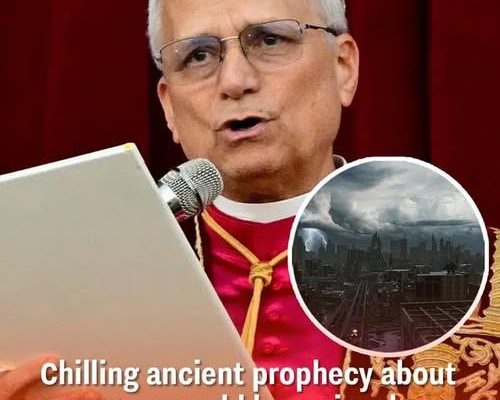As millions of Catholics globally rejoice in the election of a new pope, some theologians express concern that a 450-year-old prophecy may cast a shadow over the celebrations. On May 7, the College of Cardinals in Rome swiftly concluded the latest conclave, which commenced on Monday after the passing of 88-year-old former leader Pope Francis on Easter Monday (April 21).
Initially, many observers speculated that candidates such as Pietro Parolin, Luis Antonio Tagle, Peter Erdö, Matteo Zuppi, or Raymond Leo would succeed Francis; however, American-born Cardinal Robert Prevost emerged as the victor. The 69-year-old from Chicago, regarded as a moderate in contemporary religious views, is the first Pope from the United States and will be known as Pope Leo XIV.
Prior to the announcement, numerous mystics questioned whether the identity of Francis’ successor might correspond with a foreboding prediction made centuries ago. Nostradamus’ Prophecies: A Caution for the Church? In 1555, French astrologer Michel de Nostredame, commonly known as Nostradamus, authored a book titled Les Prophéties, which included several disquieting predictions.
Among these was one concerning the future of Catholicism and the papacy, foreseeing significant turmoil for the Church. In addition to forecasting ‘cruel wars,’ deadly plagues, and natural calamities, Nostradamus made a disturbing prediction regarding the papacy: the demise of a ‘very old Pope,’ which many interpret as a reference to Pope Francis, followed by a decline in the Catholic Church’s influence. ‘
Through the death of a very old Pontiff / A Roman of good age will be elected / Of him it will be said that he weakens his seat / But long will he sit and in mordant activity,’ Nostradamus wrote.
Saint Malachy’s prophecies were recorded in the Prophecy of the Popes, a text written by the Benedictine monk Arnold Wion. According to this book, Malachy’s vision extended to the final pope, with ominous implications for the Church’s future.
Wion documented that Malachy had predicted Pope Francis’ death would “spark the day of judgment” and that the last pope, “Peter the Roman,” would reign during “the final persecution of the Holy Roman Church.”
“In the final persecution of the Holy Roman Church there will reign Peter the Roman, who will feed his flock amid many tribulations, after which the seven-hilled city will be destroyed and the dreadful Judge will judge the people,” Malachy allegedly prophesied. “The End.”
The notion that the final papacy could usher in the end times is a chilling interpretation of Malachy’s prophecy. The reference to “Peter the Roman” and the destruction of the “seven-hilled city” (a well-known reference to Rome) has raised alarms among some who believe that the election of Pope Leo XIV may be the beginning of this fateful era.
The prophecies of Saint Malachy were chronicled in the Prophecy of the Popes, authored by the Benedictine monk Arnold Wion. This text asserts that Malachy’s foresight encompassed the final pope, suggesting dire consequences for the future of the Church.
Wion recorded that Malachy foretold that the death of Pope Francis would trigger the ‘day of judgment’ and that the last pope, referred to as ‘Peter the Roman,’ would preside over ‘the final persecution of the Holy Roman Church.’
Malachy is said to have prophesied, ‘In the final persecution of the Holy Roman Church, Peter the Roman will shepherd his flock through numerous tribulations, after which the city of seven hills will be devastated, and the fearsome Judge will pass judgment on the people.’
This interpretation of Malachy’s prophecy, which implies that the last papacy could herald the end times, is indeed unsettling. The mention of ‘Peter the Roman’ and the destruction of the ‘seven-hilled city’—a clear reference to Rome—has alarmed some who speculate that the election of Pope Leo XIV may signal the onset of this ominous period.
The recent election of the first American pope, alongside the revival of these ancient prophecies, has sparked considerable speculation about their significance in contemporary times. Many adherents of mysticism and prophecy perceive the coincidence of Pope Leo XIV’s election with these predictions as more than just happenstance.
Church authorities, particularly those in the Vatican, have sought to distance themselves from these forecasts, choosing instead to emphasize the faith, guidance, and mission of the papacy in contemporary times. Although these predictions have intrigued the public, the Church asserts that the course of the papacy is determined by divine will rather than mystical or astrological influences.
In conclusion, the election of Pope Leo XIV, alongside the revival of ancient prophecies attributed to Nostradamus and Saint Malachy, has generated both fear and fascination. For some, these prophecies act as a forewarning of an approaching apocalypse, while others dismiss them as mere coincidences that do not warrant serious attention.
Despite the unsettling narrative these prophecies may present for the future, the true influence of Pope Leo XIV on the Catholic Church is yet to be determined. His leadership style, spiritual direction, and engagement with the global community will ultimately shape his papacy. Nevertheless, with these ancient warnings looming over his election, the world will undoubtedly observe closely to witness the developments that follow.
Whether these prophecies merely echo historical trends or genuinely signal future events, it is evident that Pope Leo XIV’s papacy has commenced with a blend of significant historical relevance and an unsettling aura of mystery.


